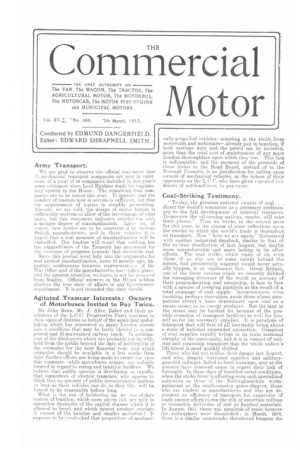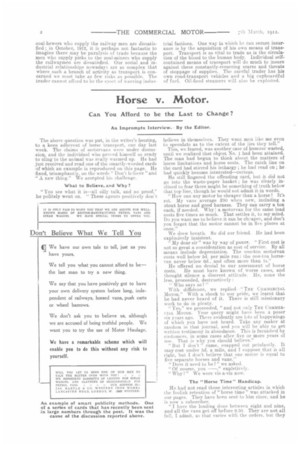Army Transport.
Page 1

Page 2

If you've noticed an error in this article please click here to report it so we can fix it.
We are glad to observe the official statement that 15 mechanical transport companies are now in existence, of a total of 19 companies included in last year's army estimates when Lord Haldane made his explanatory speech in the House. The remaining four companies are to be raised this year. It appears that the number of tractors now in service is sufficient, but that the acquirement of lorries is steadily proceeding. Already, we are told, the design of motor lorries is sufficiently uniform to allow of the interchange of vital parts, but this statement indicates satisliteiiin with a meagre degree of standardization. Later on, of course. new lorries are to be construct:-d by various British manufacturers, and in these vehicles it is hoped that a real measure of standardization will be embodied. Our readers will recall that nothing but the niggardliness of the Treasury has accemited for the slowness of progress towards that desirable end.
Since this journal went fully into the arguments for and against standardization, some 18 months ago important conferences between representatives of the War Office and of the manufacturers have iaken place. and the present situation, we learn, is not far removed front finality. Official answers in the Rouse seldom disclose the true state of affairs in any Government department. It is not intended that they should.
Agitated Tramcar Interests : Owners of Motorbuses Invited to Pay Twice.
Sir John Benn, Mr. J. Allen Baker and their coadjutors of the L.C.C. Progressive Party continue to show signs of distress on behalf of the municipal undertaking which has converted so many London streets into a condition that may be fairly likened to a congested and ill-maintained railway track. In anticipation of the disclosures which Can probably not be withheld from the public beyond the date of publication of the estimates for the next financial year. and which estimates should be available in a few weeks from date, further efforts are being made to create the view that tramcars—while motorbuses escape—are unfairly treated in regard to rating and taxation burdens. We believe that public opinion is developing so rapidly. that supporters of electric tramcars, who appear to think that no amount of public inconvenience matters sn long as their vehicles can do as, they like, will be forced to be reasonable before long. What is the use of bolstering up an out-of-date system of traction, which costs above rid, per mile in oneratlon (inclusive of the capital charges which it is allowed to bear), and which cannot produce receipts in excess of the handier and smaller motorbus? it appears to be overlooked that proprietors of mechani
cally-propelled vehicles—counting in the yields from naotorcabs and motorcars— already pay in taxation, if both carriage duty and the petrol tax be included, more than the total cost of maintenance of any main London thoroughfare upon which they run. This fact is indisputable, and the payment of the proceeds of those levies to the Road Board, instead of to the Borough Councils, is no justification for calling upon owners of mechanical vehicles, at the behest of their opponents on the L.C.C. who have given repeated evidences of unfriendliness, to pay twice.
Coal-Striking Testimony.
"To-day, the greatest national owners of coal . . direct the world's commerce as a necessary preliminary to the full development of internal resources. To-morrow the oil-owning nations, maybe, will take their places." Thus we wrote, in the second issue for this year, in the course of some reflections upon the extent to which the world's trade is dependent on transport. Now " here we are again," threatened with another industrial deadlock, similar to that of the railway disaffection of last August, but maybe more uncomfortable and more lasting in its after effects. The coal strike, which many of us, even those of us who are to some extent behind the scenes, had persistently wagered would never actually happen, is an unpleasant fact. Great Britain, one of the three nations which we recently dubbed the managing directors of the world on account of their preponderating coal ownership, is face to face with a species of creeping paralysis as the result of a total stoppage of coal supply. Inconvenience, even hardship, perhaps starvation, await those whose occupations reveal a basic dependance upon coal as a steam raiser, as an energy producer. But the man in the street may be hardest hit because of the possible cessation of transport facilities as well for himself as for his necessary supplies. It is paralysis of transport that will first of all inevitably bring about a state of national suspended animation. Cessation of coal supplies rapidly brings in its train sectional atrophy of the community, but it is in respect of railway and steamship transport that the whole nation's life blood is most quickly clotted.
Those who did not realize their danger last August, and who, despite restricted supplies and militaryguarded railways, failed to heed warnings, may at the present have renewed cause to regret their lack of foresight. In these days of troubled social conditions, when the strike fever is affecting even such specialized industries as those of the Nottinghamshire wormgatherers or the south-country grave-diggers, those who are traders or manufaeturers and who are dependent on efficiency of transport for expansion of trade cannot afford to run the risk of uncertain railway or steamship deliveries of raw or finished materials. In August, 1911, there was paralysis of trade because the railwaymen were dissatisfied in March, l9there is a similar catastrophe threatened because the
e coal-hewers who supply the railway men are dissatisfied; in October, 1912, it is perhaps not fantastic to imagine there may be paralysis of trade because the men who supply picks to the coal-miners who supply the railwaymen are dissatisfied. Our social and industrial relationships nowadays are so complex that where such a branch of activity as transport is concerned we must take as few risks as possible. The trader cannot afford to be the sport of warring indus
trial factions. One way in which he can secure insurance is by the acquisition of his own means of transport. Transport is as vital to trade as is the circulation of the blood to the human body. Individual selfcontained means of transport will do much to insure against these constantly-recurring scares and threats of stoppage of supplies. The careful trader has his own road-transport vehicles and a big cupboardful of fuel. Oil-fired steamers will also be exploited.






















